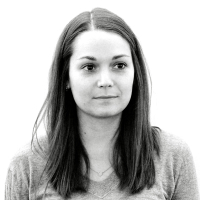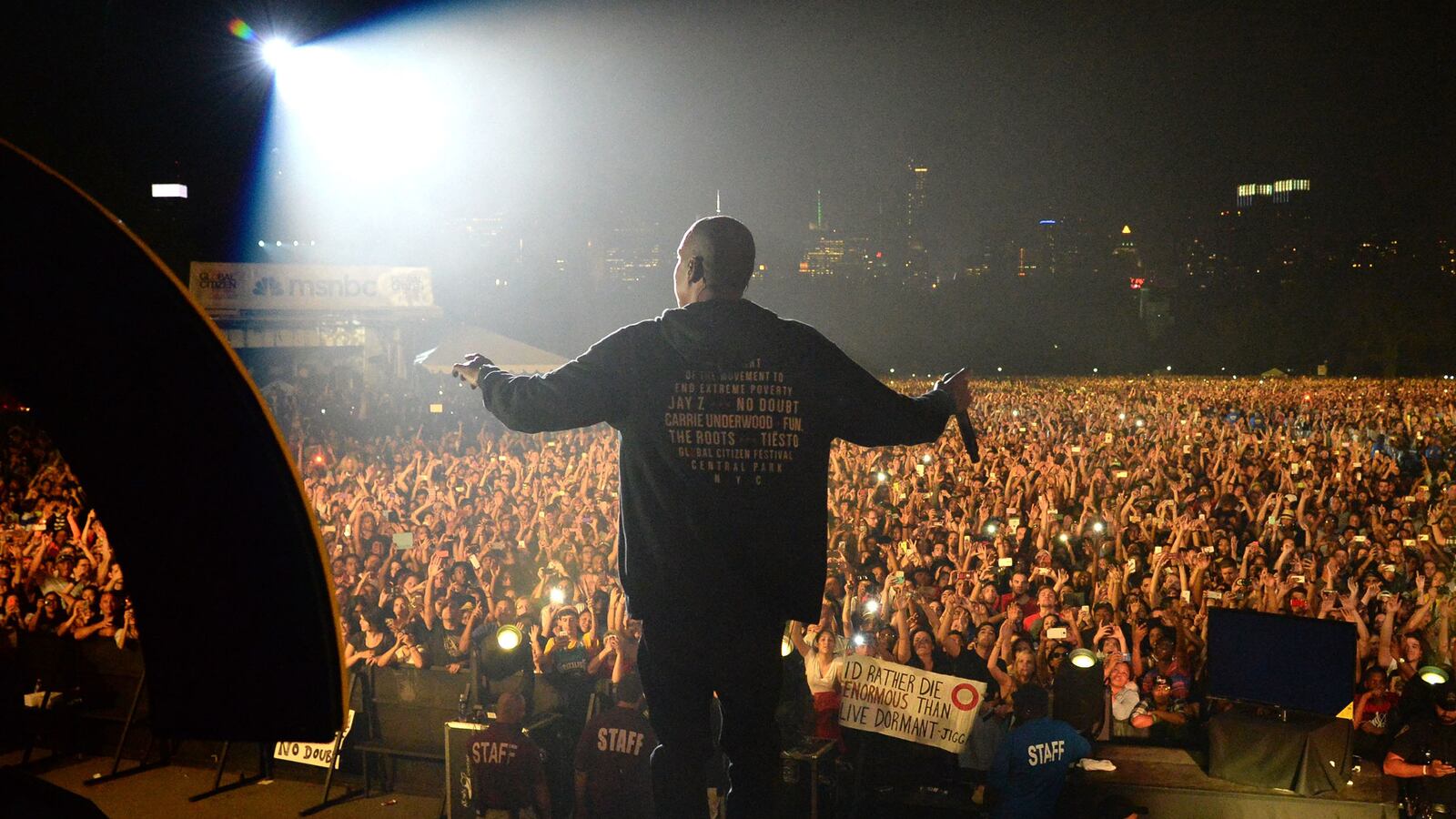It’s slightly after 4 p.m. on the last, and most gorgeous Saturday in September, and just outside the gates surrounding the Global Citizen Festival on Central Park’s great lawn, tensions are high. Tiesto, the first performer of the day, is on stage, but from out here, the Dutch DJ’s mixes are muffled and crackling.
“I came here for him,” one woman groans, gesturing impatiently toward where the music is coming from.
Actually, she and the rest of the people pushing and whining and snapping at one another as they wait to be funneled through security, technically came here to support the fight to end extreme poverty. But somewhere in between receiving free tickets to see big-name musicians and celebrities in exchange for taking minimally-exhaustive online “action”—signing petitions, emailing world leaders, sharing an informative video on social media—and being made to wait under the shade of Central Park trees for upwards of an hour, it seemed they’d forgotten the cause that brought them here and let entitlement set in.
“If you were just a little pushier, we would be sitting in VIP by now,” a woman wearing a wide-brimmed hat and sunglasses snarls at her friend.
“We got here hours ago,” says a man with a foot brace who's given up his spot in the amorphous line to sit on a folding chair. A woman scolds her husband for disappearing and forcing her to look for him.
“Maybe you should look harder,” he snaps back at her. “I’ve been right here this whole time.”
As members of the “general public” start to gravitate to the back of what once was the media line, a reporter from another publication that shall not be named here angrily waves his credentials in the air and says, “This line is supposed to be for press only.”
Over 60,000 people were awarded tickets to the Global Citizen Festival, a benefit concert with the very specific and ambitious goal of eradicating extreme poverty by 2030. And each one of them has to go through two security checkpoints manned by NYPD officers, Secret Service agents, and police search dogs, to get there. Hence the backup.
For the third year in a row, the Australian-founded Global Poverty Project has assembled musicians, actors, and world leaders on the Great Lawn at the tail end of the annual United Nations General Assembly in New York. Between performances by Tiesto, The Roots, Fun., Carrie Underwood, No Doubt, and Jay Z, dignitaries like Indian Prime Minister Narendra Modi, U.N. Secretary-General Ban Ki-moon, World Bank Group President Jim Yong Kim, and Norwegian Prime Minister Erna Solberg take the stage to announce major commitments to education, sanitation, and vaccines in places where such basic human necessities are rare. Hence the tight security.
Once inside, it’s hard not to be humbled by the sheer magnitude of the event. The crowd seems to stretch across the entire 55 acres of grass that make up the Great Lawn, with New York City looming large in the background. From the stage, with massive video screens surrounded by intertwining, giant red circles—the Global Citizen symbol—Alicia Keys, who was introduced by Ryan Reynolds, shouts “the opposite of poverty is justice,” as the audience cheers. Diana Agron and Zachary Quinto introduce Samantha Power, the U.S. Ambassador to the U.N., who reaffirms the Obama administration’s commitment to combatting the current ebola epidemic. Nelson Mandela’s grandsons, Kweku and Ndaba Mandela, talk about the Gavi Vaccine Alliance’s mission to provide children from all over the world with life-saving immunizations for everything from diarrhea and pneumonia to polio. Prime Minister Narendra Modi announces his promise to have a toilet in every Indian home by 2019, as nearly 50 camera-wielding members of the Indian media clamor to get a shot.
The speeches are powerful. But there remains an underlying air of stress, from the media tent to the concession stands. Cameramen grumble as they haul their heavy equipment back and forth to the stage under the heat of the late afternoon sun, their T-shirts soaked with sweat. One event worker is charged with the tiresome job of making sure reporters get the access they need without interfering with the show’s sound technicians, stationed right behind them. By 6:15, the tented concession stands have run out of sandwiches and chips and are only selling granola bars and soda. There are four hours left in the program.
“They’re out of food,” one man announces to those still waiting in line. “They’re f**king out of food.”
Successfully cutting through the tension, though, is the music. From behind the desk where they’re hosting a primetime special of the event, MSNBC’s Chris Hayes and Alex Wagner dance to The Roots’ tribute to Nigerian musical and humanitarian icon Fela Kuti. Complaints and stress are put on pause for at least seven minutes as practically everyone present, from the audience to the sound engineers to the overheated cameramen, sings along with Fun. covering the Rolling Stone’s “You Can’t Always Get What You Want.”
Benefit concerts have been a popular and effective means of raising awareness and funds for different causes since George Harrison’s first Concert for Bangladesh at Madison Square Garden in 1971. In fact, UNICEF’s George Harrison Fund continues to benefit from the live album and DVD’s of a documentary of the concert that raised awareness and millions of dollars in aid for refugees of the former East Pakistan. The 1985 Live Aid concert was seen on television by 2 billion people in 60 countries and raised $245 million for Ethiopian famine. In the decades since, millions of dollars have been raised through concerts thrown together in response to tragedies like 9/11, Hurricane Katrina, the 2004 Indian Ocean earthquake and tsunami, and the 2010 earthquake that devastated Haiti.
Where the Global Citizen Festival differs from these traditional benefit concerts is that it does not charge admission nor does it solicit donations from the audience. Rather, those who wish to attend the show are required to “take action,” using the power of a free Jay Z concert to rally tens of thousands of people to urge world leaders to make tangible commitments to change. The Global Citizen Festival’s ability to lure 60,000 people to, essentially, a six-hour conference on global poverty with free music is kind of like timeshare companies that offer free vacations in exchange for a 90-minute sales presentation. But it works. How many people now know that women and girls in the developing world are particularly harmed by the lack of access to toilets because not only is defecating in the open unsanitary, it puts them at risk of sexual assault?
All tension seemed to dissipate with the sunset. No Doubt was undoubtedly responsible for officially turning the event into a giant dance party, with a sea of bodies, arms raised, jumping up and down in unison to their now-classic hit “Spiderweb.” By the time Jay Z took the stage, introduced by a recording of Frank Sinatra’s “New York, New York,” played alongside black-and-white images of the city, the event workers who’d spent the whole afternoon frantically making sure everything went smoothly could finally let loose, dancing and singing along to all of the rapper’s songs. NBC News correspondent Tamron Hall, who’d been conducting interviews from the audience throughout the show, was now dancing in the middle of the crowd with her camera crew. When Beyonce confirmed the speculation that had been circulating throughout the day and joined her husband for the last few songs of the night, even the toughest-looking roadies and sound technicians were spotted taking selfies, trying to capture America’s most famous couple on stage behind them.
Despite the fact that the mass of people who had just covered the great lawn was now swarming the exits, leaving the park was not nearly as stressful as entering—in fact it was kind of fun. No alcohol (and barely any food) was sold at the event, but there was a buzz permeating throughout the crowd that made it evident why benefit concerts are so impactful.
Music, the great equalizer, can reach people in a way nothing else can. Carrie Underwood’s voice rang out through the city. Gwen Stefani and her crew made us party like it was 1995. Jay Z’s adrenaline and love for his city was palpable across the great lawn.
Plus, Beyonce showed up. The show was unforgettable—and it was for a good cause.





